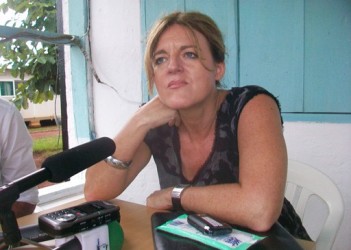UN admits continuous failure to detect Murle attackers
February 22, 2013 (JUBA) – The United Nations Mission in South Sudan (UNMISS) has publicly admitted it failed to detect rebel attackers and provide early warning to at risk civilians in Jonglei state, the special representative of the UN secretary-general, Hilde Johnson, has told the UN radio in Juba.

However, Johnson on Thursday told the Juba-headquartered UN radio that her organisation did not detect the recent movement of rebels loyal to David Yau Yau, who brutally massacred over 104 Lou-Nuer civilians and 14 South Sudanese army (SPLA) soldiers in Walgak area of Akobo county.
In a statement released after the attacks, Akobo county commissioner Goi Jooyul said “unarmed Akobo civilians escorting their cattle were murdered in cold blood”, adding that an unspecified number of women and children were also abducted, while thousands of head of cattle were also seized in the surprise attack, which had overwhelmed an SPLA force accompanying the people.
UNMISS says it has been unable to track the movement of the attackers and their looted cattle back to Pibor county.
It is not the first time the agency has failed to detect Murle attackers. When over 600 Lou-Nuer were attacked and killed by a heavily armed group of Murle fighters in June 2012, UNMISS was also caught by surprise, despite its helicopter patrols helicopters providing regular surveillance in Jonglei’s hot spots.
The failure by UNMISS to detect Murle-led attacks on Dinka Bor or Lou-Nuer has attracted fierce criticisms by members from other communities in Jonglei, who accuse the organisation of bias.
A Lou-Nuer student at the University of Juba told Sudan Tribune the UN was biased towards Murle when it came to inter-communal conflicts in Jonglei.
“When the Lou-Nuer youth were moving to Pibor county to retaliate in December 2011, UNMISS immediately detected their movement and cried to the government to stop the attackers, but when Murle attack us, UNMISS pretends not to detect their movement,” lamented the student, who asked to remain anonymous.
“The UN is unreasonably siding with the minority Murle against [the] Lou-Nuer majority in Jonglei without considering that the minority Murle are the aggressors and also disobey the government and have formed a rebellion as well,” he continued.
The UN is also accused of exaggerating issues about Murle victims, while keeping silent when other communities in Jonglei become victims of Murle aggression.
Johnson explained the challenges her organisation faces, including the tactical movement of some attackers such as Murle who move at night and in separate smaller columns only to converge at the point of the attack, unlike the Lou-Nuer, who move in numbers of several thousand and can be easily detected.
She said her organisation will try its best to improve on early warning mechanisms and protection for civilians.
South Sudan’s government is likely to consider a military option during this dry season to contain the increasing conflict in Pibor county, where most of Murle youth have now joined a rebellion against the government.
Officials say rebel leader David Yau Yau is under the direct influence of Khartoum and is only buying time in order to carry out intensive attacks against the government’s positions during the coming wet season.
(ST)
